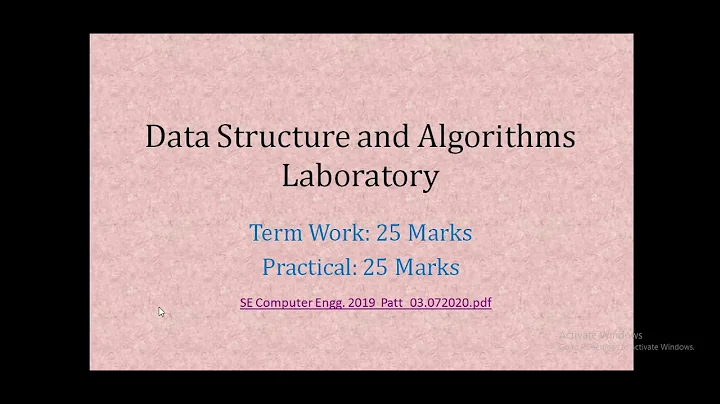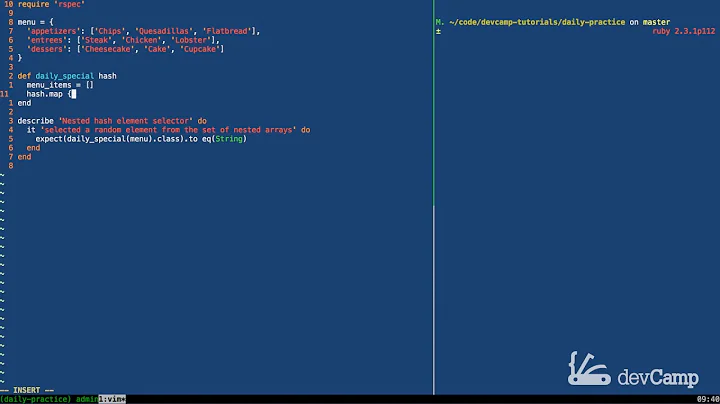Find key/value pairs deep inside a hash containing an arbitrary number of nested hashes and arrays
Solution 1
Here's a simple recursive solution:
def nested_hash_value(obj,key)
if obj.respond_to?(:key?) && obj.key?(key)
obj[key]
elsif obj.respond_to?(:each)
r = nil
obj.find{ |*a| r=nested_hash_value(a.last,key) }
r
end
end
h = { foo:[1,2,[3,4],{a:{bar:42}}] }
p nested_hash_value(h,:bar)
#=> 42
Solution 2
No need for monkey patching, just use Hashie gem: https://github.com/intridea/hashie#deepfind
user = {
name: { first: 'Bob', last: 'Boberts' },
groups: [
{ name: 'Rubyists' },
{ name: 'Open source enthusiasts' }
]
}
user.extend Hashie::Extensions::DeepFind
user.deep_find(:name) #=> { first: 'Bob', last: 'Boberts' }
For arbitrary Enumerable objects, there is another extension available, DeepLocate: https://github.com/intridea/hashie#deeplocate
Solution 3
Combining a few of the answers and comments above:
class Hash
def deep_find(key, object=self, found=nil)
if object.respond_to?(:key?) && object.key?(key)
return object[key]
elsif object.is_a? Enumerable
object.find { |*a| found = deep_find(key, a.last) }
return found
end
end
end
Solution 4
Ruby 2.3 introduces Hash#dig, which allows you to do:
h = { foo: {bar: {baz: 1}}}
h.dig(:foo, :bar, :baz) #=> 1
h.dig(:foo, :zot) #=> nil
Solution 5
A variation of barelyknown's solution: This will find all the values for a key in a hash rather than the first match.
class Hash
def deep_find(key, object=self, found=[])
if object.respond_to?(:key?) && object.key?(key)
found << object[key]
end
if object.is_a? Enumerable
found << object.collect { |*a| deep_find(key, a.last) }
end
found.flatten.compact
end
end
{a: [{b: 1}, {b: 2}]}.deep_find(:b) will return [1, 2]
Related videos on Youtube
steven_noble
Updated on November 21, 2020Comments
-
steven_noble over 3 years
A web service is returning a hash that contains an unknown number of nested hashes, some of which contain an array, which in turn contains an unknown number of nested hashes.
Some of the keys are not unique -- i.e. are present in more than one of the nested hashes.
However, all the keys that I actually care about are all unique.
Is there someway I can give a key to the top-level hash, and get back it's value even if the key-value pair is buried deep in this morass?
(The web service is Amazon Product Advertising API, which slightly varies the structure of the results that it gives depending on the number of results and the search types permitted in each product category.)
-
 Dave Newton over 12 years
Dave Newton over 12 years -
 PJP over 12 yearsIt always helps if you can create some sample data showing what you have encountered, so we don't have to imagine. Also, how is the data being sent? Do you receive XML and parse it? JSON? Or, are you using an call that returns the mystical structure and everything else is a black box?
PJP over 12 yearsIt always helps if you can create some sample data showing what you have encountered, so we don't have to imagine. Also, how is the data being sent? Do you receive XML and parse it? JSON? Or, are you using an call that returns the mystical structure and everything else is a black box?
-
-
Vigneshwaran about 11 yearsThis code caused me stack overflow. I guess it's due to Strings and/or something else that will respond to
eachmethod. I changedelsif obj.respond_to?(:each)toelsif obj.is_a?(Hash) or obj.is_a?(Array). Now it works fine. Thanks for your solution. -
Seamus Abshere over 10 yearsit would be nice if this thing printed out its path (breadcrumbs?) as it went down...
-
 Rajdeep Singh almost 9 yearsWhat if there are multiple hashes containing :bar key, what would be the solution if we want array of the values of each :bar keys?
Rajdeep Singh almost 9 yearsWhat if there are multiple hashes containing :bar key, what would be the solution if we want array of the values of each :bar keys? -
Phrogz almost 9 years@RSB Ask this as its own question if you want an answer. Better yet, try to come up with a solution yourself. (Hints: With a recursive function where you want to accumulate results, you either need to return values or use a closed-over data structure; Alternatively, you can use a non-recursive depth-first or breadth-first crawl by using a queue.)
-
JESii about 7 yearsI found the Hashi::Extensions::DeepFind to be an excellent approach. And if you're looking to find keys that are duplicated, then the deep_find_all() method is awesome. Highly recommended.
-
m1l05z over 6 yearsDidn't work for multiple params keys: { 0: [{b: '1'}], 1: [{b: '2'}] }.deep_find(:b) returns: #> '1'
-
Vaibhav Kaushal over 5 yearsThis here is what was needed!
-
 Andre Figueiredo over 5 yearsI didn't vote down, but I wouldn't vote up because I find an overkill to use a gem for such a simple solution.
Andre Figueiredo over 5 yearsI didn't vote down, but I wouldn't vote up because I find an overkill to use a gem for such a simple solution. -
Cary Swoveland almost 2 years@Andre, why wouldn't you use a gem here? This gem surely has efficient and thoroughly-tested code. How much time are you going to spend rolling your own? Recursive methods are rarely trivial and are challenging to test.





